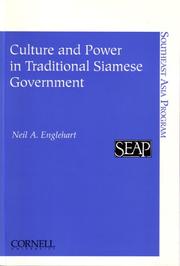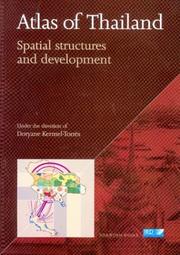| Listing 1 - 10 of 39 | << page >> |
Sort by
|

ISBN: 1501719114 9781501719110 0877271356 9780877271352 Year: 2018 Publisher: Ithaca, NY
Abstract | Keywords | Export | Availability | Bookmark
 Loading...
Loading...Choose an application
- Reference Manager
- EndNote
- RefWorks (Direct export to RefWorks)
A broad reevaluation of Siam's political culture as it existed prior to King Chulalongkorn's administrative reforms in the nineteenth century. Englehart offers evidence to show that traditional Siamese government functioned more effectively and rationally than most scholars have acknowledged.
Political culture --- Culture --- Political science --- Thailand --- Tʻai-kuo --- Hsien-lo --- Muang-Thai --- Thaimaa --- Prates Thai --- Prades Thai --- Thaïlande --- Kingdom of Thailand --- Prathēt Thai --- Tailand --- Thailandia --- Thajsko --- Royal Thai Government --- Ratcha Anachak Thai --- Koninkryk van Thailand --- تايلاند --- Tāylānd --- Tailandia --- Reino de Tailandia --- Tayilande --- Royômo de Tayilande --- Tayland Krallığı --- Pratet Tai --- Thài-kok --- Тайланд --- Каралеўства Тайланд --- Karaleŭstva Taĭland --- Tailandya --- Tajland --- Kraljevina Tajland --- Кралство Тайланд --- Kralstvo Taĭland --- Siam --- Politics and government
Book
ISBN: 1626375143 1626374279 Year: 2016 Publisher: Boulder, Colorado ; London, [England] : Lynne Rienner Publishers,
Abstract | Keywords | Export | Availability | Bookmark
 Loading...
Loading...Choose an application
- Reference Manager
- EndNote
- RefWorks (Direct export to RefWorks)
The prospects for Thailand's emergence as a democracy seemed strong in the 1990s. Yet, as most recently demonstrated by military coups in 2006 and 2014, that hasn't happened. Why not? Why have factors typically considered advantageous for democratization turned into barriers? Is there a uniquely Thai reason that democratization efforts have failed? Daniel Unger and Chandra Mahakanjana explore the intersecting and often contradictory forces that are shaping the nature of Thai politics today. Paying overdue attention to a complex of social, cultural, and institutional dynamics, they offer a nuan
Democratization --- Democratic consolidation --- Democratic transition --- Political science --- New democracies --- Thailand --- Tʻai-kuo --- Hsien-lo --- Muang-Thai --- Thaimaa --- Prates Thai --- Prades Thai --- Thaïlande --- Kingdom of Thailand --- Prathēt Thai --- Tailand --- Thailandia --- Thajsko --- Royal Thai Government --- Ratcha Anachak Thai --- Koninkryk van Thailand --- تايلاند --- Tāylānd --- Tailandia --- Reino de Tailandia --- Tayilande --- Royômo de Tayilande --- Tayland Krallığı --- Pratet Tai --- Thài-kok --- Тайланд --- Каралеўства Тайланд --- Karaleŭstva Taĭland --- Tailandya --- Tajland --- Kraljevina Tajland --- Кралство Тайланд --- Kralstvo Taĭland --- Siam --- Politics and government
Periodical
ISSN: 24681458 2452316X Year: 2016 Publisher: Bangkok Kasetsart University
Abstract | Keywords | Export | Availability | Bookmark
 Loading...
Loading...Choose an application
- Reference Manager
- EndNote
- RefWorks (Direct export to RefWorks)
Biology --- Pure sciences. Natural sciences (general) --- Agriculture --- Natural resources --- Agriculture. --- Natural resources. --- National resources --- Resources, Natural --- Farming --- Husbandry --- animal science and aquaculture --- biodiversity and evolution --- environment and ecology --- food science --- agricultural science --- forestry --- Resource-based communities --- Resource curse --- Industrial arts --- Life sciences --- Food supply --- Land use, Rural --- Economic aspects --- Thailand. --- Hsien-lo --- Karaleŭstva Taĭland --- Kingdom of Thailand --- Koninkryk van Thailand --- Kraljevina Tajland --- Kralstvo Taĭland --- Muang-Thai --- Prades Thai --- Prates Thai --- Pratet Tai --- Prathēt Thai --- Ratcha Anachak Thai --- Reino de Tailandia --- Royal Thai Government --- Royômo de Tayilande --- Tʻai-kuo --- Tailand --- Tailandia --- Tailandya --- Tajland --- Tayilande --- Tāylānd --- Tayland Krallığı --- Thài-kok --- Thaïlande --- Thailandia --- Thaimaa --- Thajsko
Periodical
ISSN: 2228835X 16863933
Abstract | Keywords | Export | Availability | Bookmark
 Loading...
Loading...Choose an application
- Reference Manager
- EndNote
- RefWorks (Direct export to RefWorks)
Research --- Technology --- Research. --- Technology. --- Thailand. --- Applied science --- Arts, Useful --- Science, Applied --- Useful arts --- Science --- Scientific research --- Science research --- Industries --- Hsien-lo --- Karaleŭstva Taĭland --- Kingdom of Thailand --- Koninkryk van Thailand --- Kraljevina Tajland --- Kralstvo Taĭland --- Muang-Thai --- Prades Thai --- Prates Thai --- Pratet Tai --- Prathēt Thai --- Ratcha Anachak Thai --- Reino de Tailandia --- Royal Thai Government --- Royômo de Tayilande --- Tʻai-kuo --- Tailand --- Tailandia --- Tailandya --- Tajland --- Tayilande --- Tāylānd --- Tayland Krallığı --- Thài-kok --- Thaïlande --- Thailandia --- Thaimaa --- Thajsko --- Industrial arts --- Material culture --- Information services --- Learning and scholarship --- Methodology --- Research teams --- Life Sciences --- General and Others --- biological sciences --- physical sciences --- Recherche
Periodical
ISSN: 24523151 Year: 2016 Publisher: Bangkok, Thailand : [Amsterdam, Netherlands?] : Kasetsart University Research and Development Institute, Elsevier
Abstract | Keywords | Export | Availability | Bookmark
 Loading...
Loading...Choose an application
- Reference Manager
- EndNote
- RefWorks (Direct export to RefWorks)
Social sciences --- Social sciences. --- Thailand. --- Behavioral sciences --- Human sciences --- Sciences, Social --- Social science --- Social studies --- Hsien-lo --- Karaleŭstva Taĭland --- Kingdom of Thailand --- Koninkryk van Thailand --- Kraljevina Tajland --- Kralstvo Taĭland --- Muang-Thai --- Prades Thai --- Prates Thai --- Pratet Tai --- Prathēt Thai --- Ratcha Anachak Thai --- Reino de Tailandia --- Royal Thai Government --- Royômo de Tayilande --- Tʻai-kuo --- Tailand --- Tailandia --- Tailandya --- Tajland --- Tayilande --- Tāylānd --- Tayland Krallığı --- Thài-kok --- Thaïlande --- Thailandia --- Thaimaa --- Thajsko --- business --- economics --- humanities --- education --- political science --- community resource development --- Civilization --- Study and teaching --- Study and teaching.
Book
ISBN: 9789048511167 904851116X 9789089641649 9089641645 9786612985225 1282985221 Year: 2011 Publisher: Amsterdam : Amsterdam University Press,
Abstract | Keywords | Export | Availability | Bookmark
 Loading...
Loading...Choose an application
- Reference Manager
- EndNote
- RefWorks (Direct export to RefWorks)
This book focuses on the so-called 'new bilateralism' phenomenon, a foreign policy development that has widespread across regions since the mid-1990s. The book asks why the policy trend of 'new bilateralism' has been pursued in spite of the widely accepted views on political and economic advantages of 'multilateralism'. It also invites an open theoretical discussion on the implications of new bilateralism for international relations. Using the case study of EU-Thailand relations, the book shows that the opportunistic foreign policy behavior of the state is particularly observable in the crisis
European Union countries -- Foreign relations -- Thailand. --- Thailand -- Foreign relations -- European Union countries. --- Regions & Countries - Europe --- History & Archaeology --- Europe - General --- European Union countries --- Thailand --- Tʻai-kuo --- Hsien-lo --- Muang-Thai --- Thaimaa --- Prates Thai --- Prades Thai --- Thaïlande --- Kingdom of Thailand --- Prathēt Thai --- Tailand --- Thailandia --- Thajsko --- Royal Thai Government --- Ratcha Anachak Thai --- Koninkryk van Thailand --- تايلاند --- Tāylānd --- Tailandia --- Reino de Tailandia --- Tayilande --- Royômo de Tayilande --- Tayland Krallığı --- Pratet Tai --- Thài-kok --- Тайланд --- Каралеўства Тайланд --- Karaleŭstva Taĭland --- Tailandya --- Tajland --- Kraljevina Tajland --- Кралство Тайланд --- Kralstvo Taĭland --- Siam --- EU countries --- Euroland --- Europe --- Relations

ISBN: 2355960291 274751868X Year: 2018 Publisher: Bangkok : Institut de recherche sur l’Asie du Sud-Est contemporaine,
Abstract | Keywords | Export | Availability | Bookmark
 Loading...
Loading...Choose an application
- Reference Manager
- EndNote
- RefWorks (Direct export to RefWorks)
À quoi doit servir l’armée dans les grands pays d’Asie du Sud-Est ? Pendant de longues années, la réponse donnée par l'Indonésie comme par la Thaïlande a été claire. Les militaires contrôlaient la vie politique, l'activité économique, et s’efforçaient d'assurer leur emprise à tous les niveaux de la société. Depuis 1992 à Bangkok et 1998 à Jakarta, les uniformes semblent de nouveau cantonnés à leur tâche traditionnelle de défense nationale. Mais ce mouvement est-il définitif et est-il même “naturel” dans des sociétés en pleine mutation ? Ce livre, qui ouvre la collection analyses en regard s’efforce d’apporter des réponses à ces questions, dessinant ainsi ce que pourrait être l’avenir des relations entre civils et militaires dans la région.
Civil-military relations --- Thailand --- Indonesia --- Armed Forces --- Political activity. --- Military and civilian power --- Military-civil relations --- Executive power --- Sociology, Military --- Military government --- Tʻai-kuo --- Hsien-lo --- Muang-Thai --- Thaimaa --- Prates Thai --- Prades Thai --- Thaïlande --- Kingdom of Thailand --- Prathēt Thai --- Tailand --- Thailandia --- Thajsko --- Royal Thai Government --- Ratcha Anachak Thai --- Koninkryk van Thailand --- تايلاند --- Tāylānd --- Tailandia --- Reino de Tailandia --- Tayilande --- Royômo de Tayilande --- Tayland Krallığı --- Pratet Tai --- Thài-kok --- Тайланд --- Каралеўства Тайланд --- Karaleŭstva Taĭland --- Tailandya --- Tajland --- Kraljevina Tajland --- Кралство Тайланд --- Kralstvo Taĭland --- Siam --- army --- Southeast Asia --- Civil Society --- political transition --- State --- authoritarism --- Military
Periodical
ISSN: 2586887X 22867481
Abstract | Keywords | Export | Availability | Bookmark
 Loading...
Loading...Choose an application
- Reference Manager
- EndNote
- RefWorks (Direct export to RefWorks)
child and mental health --- behavioral parent training --- complementary medicine for ID --- early development --- child development --- Child development --- Child mental health --- Children --- Pediatric mental health --- Child psychology --- Mental health --- Child study --- Development, Child --- Developmental biology --- Development --- Child mental health. --- Child development. --- Thailand. --- Hsien-lo --- Karaleŭstva Taĭland --- Kingdom of Thailand --- Koninkryk van Thailand --- Kraljevina Tajland --- Kralstvo Taĭland --- Muang-Thai --- Prades Thai --- Prates Thai --- Pratet Tai --- Prathēt Thai --- Ratcha Anachak Thai --- Reino de Tailandia --- Royal Thai Government --- Royômo de Tayilande --- Tʻai-kuo --- Tailand --- Tailandia --- Tailandya --- Tajland --- Tayilande --- Tāylānd --- Tayland Krallığı --- Thài-kok --- Thaïlande --- Thailandia --- Thaimaa --- Thajsko --- complementary medicine for id

ISBN: 2709922975 2709915413 9749575431 9789749575437 Year: 2020 Publisher: Marseille : IRD Éditions,
Abstract | Keywords | Export | Availability | Bookmark
 Loading...
Loading...Choose an application
- Reference Manager
- EndNote
- RefWorks (Direct export to RefWorks)
This atlas portrays Thailand’s spatial structures and presents the country’s social and economic development in a territorial context. The Kingdom of Thailand has undergone many changes throughout its long history, and most recently during its vigorous growth from the middle of the 1980s. The maps and text give a comprehensive interpretation of Thailand’s internal dynamics as well as its regional and global integration. This is the first atlas of its kind for Thailand. It includes a wide range of spatial information and maps using various computer-assisted techniques. Seventy plates of maps, accompanied with commentary, cover significant topics such as: Thailand’s relation to the world-system, its place in Eastern Asia, and its population, infrastructure, urban network, production, income, education, intra-regional dynamics. The volume brings together experts in a variety of fields and methods. It will be a valuable tool for teachers and students, planners and entrepreneurs – indeed, for anyone eager to understand recent changes and prepare future diagnoses.
Thailand --- Agriculture --- Economic conditions --- Tʻai-kuo --- Hsien-lo --- Muang-Thai --- Thaimaa --- Prates Thai --- Prades Thai --- Thaïlande --- Kingdom of Thailand --- Prathēt Thai --- Tailand --- Thailandia --- Thajsko --- Royal Thai Government --- Ratcha Anachak Thai --- Koninkryk van Thailand --- تايلاند --- Tāylānd --- Tailandia --- Reino de Tailandia --- Tayilande --- Royômo de Tayilande --- Tayland Krallığı --- Pratet Tai --- Thài-kok --- Тайланд --- Каралеўства Тайланд --- Karaleŭstva Taĭland --- Tailandya --- Tajland --- Kraljevina Tajland --- Кралство Тайланд --- Kralstvo Taĭland --- Siam --- Environmental Studies --- Thaïlande --- agriculture --- atlas --- géographie --- carte --- conditions économiques --- conditions sociales --- map --- economy
Book
ISBN: 1283692104 0299288234 9780299288235 0299288242 9780299288242 9781283692106 Year: 2012 Publisher: Madison University of Wisconsin Press
Abstract | Keywords | Export | Availability | Bookmark
 Loading...
Loading...Choose an application
- Reference Manager
- EndNote
- RefWorks (Direct export to RefWorks)
Peasants --- Peasantry --- Agricultural laborers --- Rural population --- Marks (Medieval land tenure) --- Villeinage --- Political activity --- Thailand --- Tʻai-kuo --- Hsien-lo --- Muang-Thai --- Thaimaa --- Prates Thai --- Prades Thai --- Thaïlande --- Kingdom of Thailand --- Prathēt Thai --- Tailand --- Thailandia --- Thajsko --- Royal Thai Government --- Ratcha Anachak Thai --- Koninkryk van Thailand --- تايلاند --- Tāylānd --- Tailandia --- Reino de Tailandia --- Tayilande --- Royômo de Tayilande --- Tayland Krallığı --- Pratet Tai --- Thài-kok --- Тайланд --- Каралеўства Тайланд --- Karaleŭstva Taĭland --- Tailandya --- Tajland --- Kraljevina Tajland --- Кралство Тайланд --- Kralstvo Taĭland --- Siam --- Politics and government --- Rural conditions. --- Economic conditions
| Listing 1 - 10 of 39 | << page >> |
Sort by
|

 Search
Search Feedback
Feedback About UniCat
About UniCat  Help
Help News
News